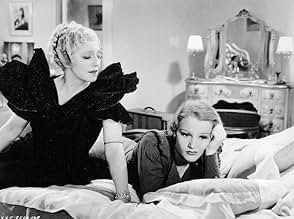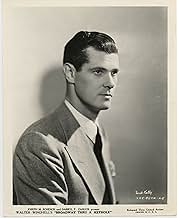Racketeer Frank Rocci is smitten with Joan Whelan, a dancer at Texas Guinan's famous Broadway night spot. He uses his influence to help her get a starring role in the show, hoping that it wi... Read allRacketeer Frank Rocci is smitten with Joan Whelan, a dancer at Texas Guinan's famous Broadway night spot. He uses his influence to help her get a starring role in the show, hoping that it will also get Joan to fall in love with him. After scoring a hit, Joan accepts Frank's marri... Read allRacketeer Frank Rocci is smitten with Joan Whelan, a dancer at Texas Guinan's famous Broadway night spot. He uses his influence to help her get a starring role in the show, hoping that it will also get Joan to fall in love with him. After scoring a hit, Joan accepts Frank's marriage proposal, more out of gratitude than love. The situation gets even stickier when she f... Read all
- Director
- Writers
- Stars
- 2nd Girl with Louie at the Beach
- (uncredited)
- Columnist #1
- (uncredited)
- Director
- Writers
- All cast & crew
- Production, box office & more at IMDbPro
Featured reviews
The plot of Broadway Through a Keyhole is nothing original, your typical backstage show business story so popular in the 1930s. But it's good to see talents like Eddie Foy, Jr., Constance Cummings, Blossom Seeley and Texas Guinan doing their thing. Paul Kelly is his usual competent self as the gangster rival of Russ's for Constance Cummings. But if you can see the film, the main reason to see it and why it ought to be preserved is as a showcase for Russ Columbo.
Columbo's commercial records, done mostly for RCA Victor, are love songs. He has two numbers in Broadway Through a Keyhole, You're My Past, Present, and Future which is a nice Harry Revel-Mack Gordon ballad which he never commercially recorded. He also sings a duet with Constance Cummings titled I Love You Pizzicato which displays a nice comic touch.
Russ Columbo only recorded about 30 sides commercially from 1930 to 1932. A contractual dispute kept him out of the recording studio until August 31, 1934 where he recorded four sides under a new contract for Brunswick records. On September 2, 1934 he was shot to death in a freak accident involving an antique cap and ball dueling pistol.
Columbo was no great actor in this film, but that's not to say that he might not have become one as Crosby did or Crosby's main rival Frank Sinatra. The Sinatra you see in Higher and Higher, his first feature film part, was no great actor either, not like he later became.
See the film if you can and speculate for yourself about the unfinished talent that was Russ Columbo.
While I found this film reasonably diverting, I must admit that the script was a bit hard to believe from time to time. Not a terrible film but one that should have been better...and less schmaltzy.
Broadway reporter-at-large Walter Winchell's saga of song, dance, danger, and romance so closely resembled the real life love triangle between entertainer Al Jolson, hoofer Ruby Keeler, and racketeer Johnny "Irish" Costello that Jolson punched Winchell out when he saw him at a Hollywood Legion prize fight, causing the columnist to sue for $500,000. The Fox film (a Darryl Zanuck Production) opens with a POV peek thru a keyhole that becomes a montage of the Great White Way (called "The Stem" at the time) where the underworld really can meet the elite. There's plenty of musical numbers on display and a couple of them are fairly inventive including tuxedo-clad songstress Frances Williams' rousing rendition of "Doin' The Uptown Lowdown" and a Busby Berkeley-style number with hoola hoops and crotch shots. There's also a romantic duet by handsome Russ Columbo and pretty little Constance Cummings, who's later seen in a transparent dress. Since it's Pre-Code, Connie's in step-ins a lot, too, and un-PC moments include a typical-for-the-time gay stereotype and derogatory slang for Jews. There's quite a bit of double intendre gender-bending going on as well- bits include Seely, dressed in a man's suit and fedora, puffs on a cigar and kisses her gangster boyfriend (after which the guy wipes his mouth) and handsome milquetoast Russ Columbo (he nearly swoons over a cut to his finger) has a too close relationship with his pal Dinwiddie, predicting the one shared by John Hodiak & Wendell Cory in DESERT FURY over a decade later.
As this film shows, silent leading man Lowell Sherman quickly became a capable director at the advent of talkies and he remained so until his untimely death in December, 1934. The British-born Constance Cummings was a popular leading lady for a couple of years in the early '30s and in addition to a top-notch supporting cast, the Broadway luminaries on hand included notorious "Queen Of The Speakeasies" Texas Guinan, the Sophie Tucker-ish Blossom Seely, singer/dancer Frances Williams, Eddie Foy, Jr., Abe Lyman & His Orchestra, and Winchell himself. Young Lucille Ball has a bit as a Miami Beach golddigger as does Ann Sothern & Susan Fleming (soon-to-be Mrs. Harpo Marx) as chorines. Lots of fun!
The music was written by the team of Bert Gordon/Harry Revel but the songs are not good ones and none became a standard. This was the biggest letdown when watching the movie, even more so than the uninspired screenplay. I guess the only thing to recommend it is the novelty of the appearance of the three stars in the same picture. The title is merely a tantalizing come-on for a small return.
Storyline
Did you know
- TriviaThe film is based so exactly on the courtship of Ruby Keeler and Al Jolson that Jolson, having read the script, knocked out Walter Winchell when they met accidentally at the Hollywood American Legion stadium on the night of July 21, 1933. Keeler, who was a dancer at Texas Guinan's nightclub, was dating gangster Larry Fay when she met Jolson. Fay visited Jolson after hearing of this just to tell him that he could marry her.
- Quotes
2nd Girl with Louie at the Beach: [after Louie's friends walk away from him] Well, you certainly were the life of the party, Louie, while it lasted...
- ConnectionsEdited into Prohibition: Thirteen Years That Changed America (1997)
- SoundtracksDoin' the Uptown Lowdown
Music by Harry Revel
Lyrics by Mack Gordon
Sung and Danced by Frances Williams with chorus and the Abe Lyman Orchestra (as Abe Lyman Band)
Danced by Dewey Barto and George Mann
Details
- Release date
- Country of origin
- Language
- Also known as
- Broadway Love
- Production company
- See more company credits at IMDbPro
- Runtime1 hour 30 minutes
- Color
- Aspect ratio
- 1.37 : 1
Contribute to this page





































